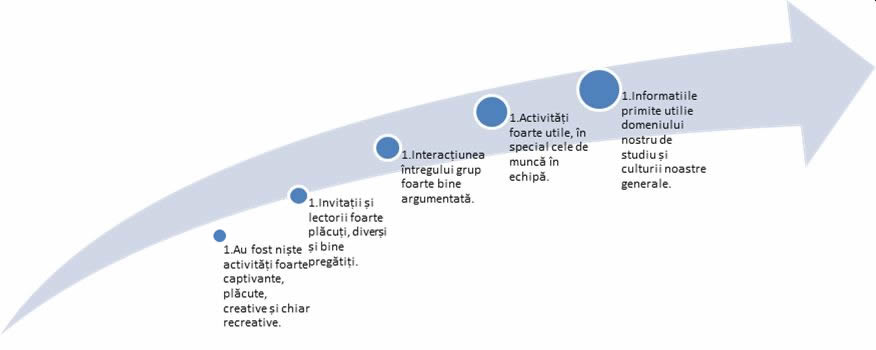
| Home | Leader & Speakers | Aim & Goals | Teaching | Events | Documentary | Breaking News |
Events
Events from 2023
1. Summer school European Youth Today, Europe’s Leaders of Tomorrow “Together for a better Europe”, Third Edition, 11th-15th July 2023
Why a summer school? Summer learning programs have the potential to help youth improve their academic outcomes and also give them the opportunity to make long lasting memories with colleagues and professors. The topic proposed for this pilot activity is The European youth today - Europe's leaders of tomorrow” (“Together for a better Europe”) aiming at deepening analyse in the European studies, in an attractive manner that will stimulate the imagination of students and the implementation of the skills and knowledge gained.
The teaching instruments used were interactive, such as roundtable discussions, group presentations, simulations, debate club, quiz, contests, workshops and team work. The topics of this edition were: Promoting diversity in university education: “Forthem University Alliance”; Privacy and security in cyber space; The general regulation on the protection of personal data - European model of good practices in the field of human rights; Eastern Partnership states between Neighborhood Policy and candidate status; SMART power in EU - The case of the Republic of Moldova; AI and European security governance: scenario for identifying risks and opportunities; Migration in the European Union during 2022-2023: Challenges, Policies and International Perspectives.
Special attention was payed to the teaching activity called summer course “#WheretoEurope?” - ReThinking a multicultural Europe: From Theory to Practice. The lecturers of this course were Lect.Claudia Anamaria Iov, PhD., and Prof.Adrian Liviu Ivan, PhD. At this edition we had some invited speakers: Prof. Katerina Veljanovska Blahzevska, PhD., Faculty of Security Studies, Vice-Rector for Science MIT University, (Skopje, Republic of Macedonia), with a lecture on True values, new projections, European perspectives, from UNHCR Republic of Moldova, Cristina Paknehad Şabnam, PhD.c., with an intervention on UNHCR Moldova – a year and a half of activity with refugees from Ukraine and Djavid Ahmad Paknehad, with his life story as an Afghan refugee in Moldova, The story of a refugee from Afghanistan: "I have two homelands that I love".
This activity was dedicated to students from our university and other universities from Romania and the Republic of Moldova. The invited lecturers were professors and specialists in international relations, history, law and European studies, from Romania and abroad (the Republic of Moldova, Afganistan, North Macedonia).
Students’ feedback

2. Third meeting of the Debate Club “Europe4Minorities”, July, 11th, 2023, via Zoom. The topic debated was The war in Ukraine - between populism and leadership. The debate club gave 27 students the chance to valorise their knowledge and imagination and to develope competences of critical thinking.
Students’ feedback

3. Closing session ”ReThinking Europe4Minorites for the New Generation of EU Citizens”, August, 28th, 2023, at Babeş-Bolyai University. The event brought together over 20 professors, specialists and students.
Past events from 2022
1. International Conference Migration Dynamics and New Trends in European (In)Security, Ninth Edition, Cluj-Napoca, 27th-28th October, 2022, via Zoom and on-site;
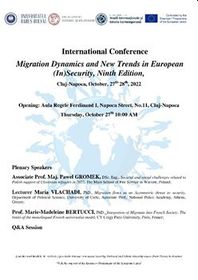 |
 |
 |
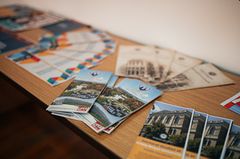 |
(For details see the Conference programme)
The ninth edition of the international conference Migration Dynamics and New Trends in European (In)Security coverd two separate but interconnected topics: on one hand, the migration issues, involving topics related to societal security, identity(ies), minority issues, with special focus on the migration issues and on the other hand security studies. The president of the International Conference and the moderator of this event was Lecturer Claudia Anamaria Iov,PhD, Module Leader.
The conference brings together world-class specialists, professors, young researchers and students, covering two separate, but interconnected topics: on one hand, migration issues and on the other hand, security studies. The scientific activity of this event is divided into three panels: Intelligence and Governance for sustainable migration policies; Migration - (In)Security Nexus: International Migration and Security and the third one, Citizenship, Identity and Social Challenges.
Bios plenary speakers
 |
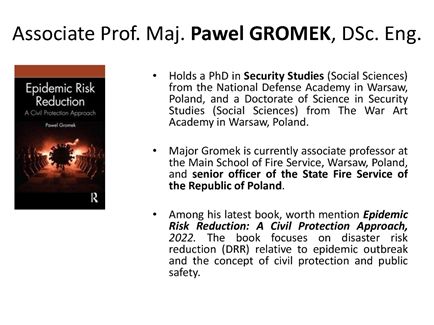 |
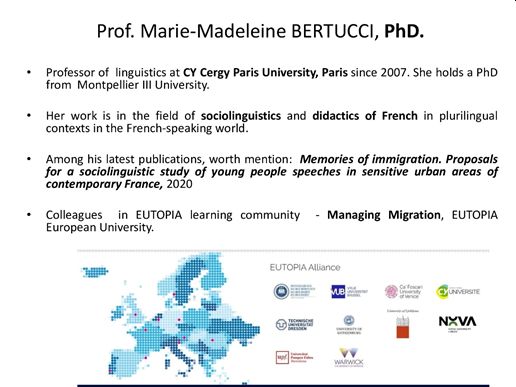 | |
Check out the Conference volume 2023, “Migration Dynamics and New Trends in European (In)Security Old Challenges in a Changing World”, CLAUDIA ANAMARIA IOV (Ed.), 2023. We would like to thank all those involved in the creation of this volume for the human and professional quality they showed in the implementation of activities, for the support provided, their expertise and high scientific works.
Photo gallery

See you all next year in Cluj-Napoca!

2. Workshop Open Educational Resources (OER) and Non - Formal Education in European studies, 16th-17th May, 2022 Babeş-Bolyai University.
The event brought together over 35 professors, specialists, students, qualified trainers, European academics and researchers, other coordinators of Modules, Centres of Excellence, Jean Monnet Chairs and supported Institutions, policy makers at local (e.g. mayors and counsellors), regional and national level as well as organised civil society and schools. This workshop was meant to be a guide on the European Union knowledge and a tutor for putting in practice the new curricular structure. Moreover, the activity introduced teachers to the concept of non-formal /informal education, facilitated the dialogue and created a community of professors willing to work together in making European studies a desired and attractive class for students.
The event had 2 interconnected parts: the first part dedicated to Open Educational Resources and the second part to non-formal education. The discussions, in the first part, payed a special attention to the need for Open Educational Resources on issues like European studies and minority issues. Policy context of OER on national level: The government has recently (July 2016) adopted its 3rd OGP National Action Plan, which includes commitments to adopt an OER policy (by 2018) and create the national OER Repository (by 2017). There are policy discussions about opening a new digital textbooks program. The Open Access principles were included in the relevant national strategy for research but no implementation program has been initiated.

The second part of this work-shop was dedicated to Non formal education, addressing the needs for non-formal means of education and exploring its advantages. It was designed to bring together professors and students outside class activities to explore together means of non-formal education, applied to EU studies. The students are expected to act more like actors and not like spectators.
The teaching instruments used were interactive, such as roundtable discussions, group presentations, simulations, teambuilding and team work. Special attention was payed to an activity called How I would like to be taught, ( a roundtable discussion between students and professors). This type of activity facilitated the transfer of information, expectations and needs between the groups direct involed in the teaching/learning process.
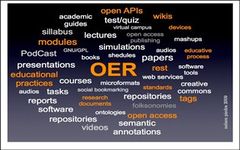
3. Summer school European Youth Today, Europe’s Leaders of Tomorrow “Together for a better Europe”, Second Edition, 11th-15th July 2022
Why a summer school? Summer learning programs have the potential to help youth improve their academic outcomes and also give them the opportunity to make long lasting memories with colleagues and professors. The topic proposed for this pilot activity is The European youth today - Europe's leaders of tomorrow” (“Together for a better Europe”) aiming at deepening analyse in the European studies, in an attractive manner that will stimulate the imagination of students and the implementation of the skills and knowledge gained. On-going work in diversity, equity, and inclusion - What does it mean to live our mission? What does it mean to be a member of the European community?
The teaching instruments used were interactive, such as roundtable discussions, group presentations, simulations, debate club, quiz, contests, workshops and team work. The topics of this edition were: Resources and strategic planning – a new paradigm in security management in organizations; The "special operation" in Ukraine and its effects on Europe - Fake news; Management of youth issues; Conference on the Future of Europe: Final Report; Europe4Minorities Debate Club”; Cyber security and the effects on young people's lives; The effects of the war in Ukraine on the global economy - The price of oil and gas;
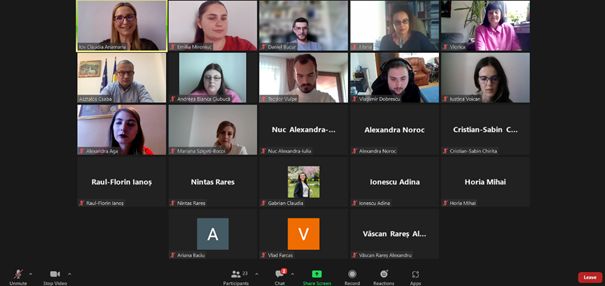
Special attention was payed to the teaching activity called Summer course “#WheretoEurope?” - ReThinking a multicultural Europe: From Theory to Practice. The lecturers of this course were Lect.Claudia Anamaria Iov, PhD., and Prof.Adrian Liviu Ivan, PhD. At this edition we had some invited guests: Vlachadi Maria, PhD., from the Department of Political Science, (University of Crete), with a lecture on Intercultural Mediation as a Policy of Managing the Migrant-Refugee Crisis and from UNHCR Republicof Moldova, Sergiu Găină and Irina Odobescu with a intervention on The war in Ukraine and its effects on Europe – Refugees, European and international framework.
This activity was dedicated to students from our university and other universities from Romania and the Republic of Moldova. The invited lecturers were professors and specialists in international relations, history, law and European studies, from Romania and abroad (Greece, the Republic of Moldova, Afganistan, North Macedonia, France).
Students’ feedback
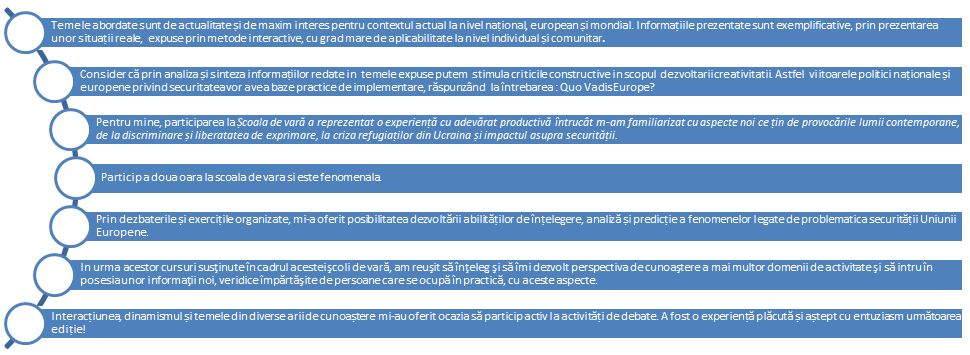
4. Second meeting of the Debate Club “Europe4Minorities”, July, 13th, 2022, via Zoom. The topic debated was The refugee crisis in EU: What is to be done?. The debate club gave 25 students the chance to valorise their knowledge and imagination and to develope competences of critical thinking.
Students’ feedback

Past events from 2021
International Conference Migration Dynamics and New Trends in European (In)Security, Eight Edition, Cluj-Napoca, 27th – 28th October 2021, via Zoom (For details see the Conference programme, Zoom recordings, Participants’ PowerPoint presentations)
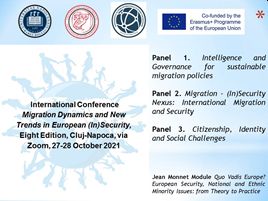
The eight edition of the international conference Migration Dynamics and New Trends in European (In)Security covered two separate but interconnected topics: on one hand, the migration issues, involving topics related to societal security, identity(ies), minority issues, with special focus on the migration and refugee issues and on the other hand security studies. The event, successfully launched in 2013 in the frame of the Jean Monnet Life Long Learning Programme, established itself as a visible academic event for the field of international relations and security studies. The president of the International Conference is Lect.Claudia Anamaria IOV, PhD, the Module Leader. During the two-days conference, keynotes, experts, professors, researchers, PhD candidates, civil society activists, consultants, policy advocates and many more exchanged their views on conference topics. The novelty of this years’ edition was the book launch The European Union In The Age Of (In)Security - From Theory To Practice, (Ed. Claudia Anamaria Iov), Presa Universitară Clujeană, 2020. Prof. Iov made an interesting presentation of the volume and an intensive Q&A session took place at the end of the event.
Some of the materials presented at the conference were published in the conference volume. Check out the Conference volume “Migration Dynamics and New Trends in European (In)Security Crises, Challenges and Opportunities”, CLAUDIAANAMARIA IOV (Ed.), Presa Universitară Clujeană, 2022.
We want to thank our speakers and participans of the conference. See you all next year!
Other events in 2021
1. Summer school European Youth Today, Europe’s Leaders of Tomorrow “Together for a better Europe”, First Edition, 14th-18th July 2021
Why a summer school? Summer learning programs have the potential to help youth improve their academic outcomes and also give them the opportunity to make long lasting memories with colleagues and professors. The topic proposed for this pilot activity is The European youth today - Europe's leaders of tomorrow” (“Together for a better Europe”) aiming at deepening analyse in the European studies, in an attractive manner that will stimulate the imagination of students and the implementation of the skills and knowledge gained.
The teaching instruments used were interactive, such as roundtable discussions, group presentations, simulations, debate club, quiz, contests, workshops and team work. The topics of this edition were: Career satisfaction – at the national or European level?; Workshop - Integration models of people with a migration background. From fake news to community initiatives; The European Union and the Eastern Neighborhood; Europe4Minorities Debate Club”; Conference on the future of Europe: How much do we really know about the EU and the EU institutions?.
Special attention was payed to the teaching activity called Summer course “#WheretoEurope?” - ReThinking a multicultural Europe: From Theory to Practice. The lecturers of this course were Lect.Claudia Anamaria Iov, PhD., and Prof.Adrian Liviu Ivan, PhD. At this edition we had some invited guests: Amb.Prof.Adrian Cioroianu PhD., from the Faculty of History, (Bucharest University), with a lecture on Today's youth, tomorrow's European leaders - Together for a stronger Europe and Lect. Vasile Adrian Cămărăşan, PhD., with a lecture on Migration - Concept, realities, implications.
This activity was dedicated to students from our university and other universities from Romania and the Republic of Moldova. The invited lecturers were professors and specialists in international relations, history, law and European studies, from Romania and abroad.
Students’ feedback

2. First meeting of the Debate Club “Europe4Minorities”, July, 17th, 2021, via Zoom. The topic debated was The effects of the COVID-19 pandemic on inter-ethnic relations and the creation of stereotypes. The debate club gave 34 students the chance to valorise their knowledge and imagination and to develope competences of critical thinking.
Students’ feedback
